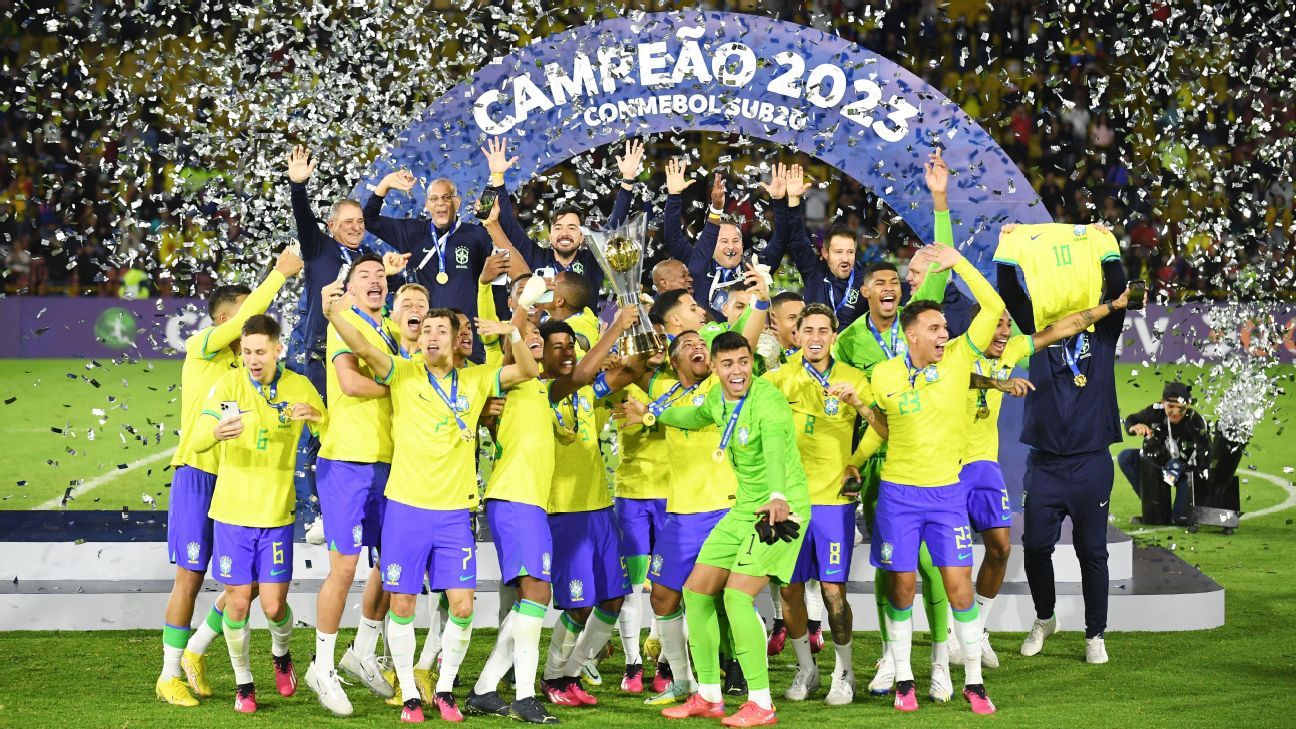The South American Under-20 Championships came to a conclusion on Sunday with Uruguay and Brazil disputing the title. The continent’s other two slots in the World Cup at U20 level, taking place in Indonesia in May and June, had gone to hosts Colombia and Ecuador, and a big crowd gathered in Bogota to see who would be champions.
Uruguay needed a draw. Brazil had to win — and got it in the end, though it took a long time coming. The deadlock was finally broken six minutes before the end of normal time, and in the dying seconds Brazil added another on the counter-attack to complete a 2-0 victory that had an air of inevitability about it.
This competition has two main problems. One is that it not played during a FIFA-sanctioned window. There is no obligation on clubs to release players. And with South Americans moving to Europe at an ever-younger age, the number of absentees is growing. There was a marked change from four years ago (the 2021 version was cancelled because of the pandemic), and Ecuador felt it most. They were the South American champions in 2019. As a consequence, European clubs have become more aware of the excellence of their youth development work. More of their youngsters have been sold abroad, and some of the best of them were not made available for this tournament. Ecuador’s 2023 side were a poor comparison, and only a win over Paraguay on the final day carried them over the line.
– Stream on ESPN+: LaLiga, Bundesliga, more (U.S.)
Many teams suffered from the absence of key players. Colombia lost star striker Jhon Duran on the eve of the competition when he signed for Aston Villa. Brazil suffered more than most, with even a number of domestic clubs refusing to release players. Coach Ramon Menezes had to make nine late changes to his squad. But then, with its giant size, Brazil has a huge talent pool from which to select. And they came motivated. After amazingly missing out on three of the last four Under-20 World Cups, they were determined that this time there would be no mistakes. They were fit and ready — and this made all the difference.
The second problem with the South American Under-20 Championships is a calendar bearing on insanity. Nine games in three weeks is surely too much of a good thing. The level was competitive. Even Peru, who lost all four of their group games, were never rolled over easily. The entire second stage, where the top six sides faced each other, did not contain a single game where the winning side could take its foot off the pedal with, say, half an hour to go. The games were full of cut and thrust, and towards the end of the competition, it was clear that this was taking a toll.
Brazil played their nine games in 25 days — the full extent of the tournament. Uruguay played theirs in 22 days. By the end some of their key players — notably captain and midfield organiser Fabricio Diaz — were fading fast. Brazil were bigger and faster. After a cagey first half in Bogota, Brazil came out firing after the interval, and the game (and the title) boiled down to a question of whether Uruguay could hang on.
They came close. Their pair of centre-backs held firm. One of them, Sebastian Boselli, gave a masterclass in handling Brazil’s hulking, talented centre-forward Vitor Roque. At the other end, Luciano Rodriguez, probably the player of the tournament (and certainly the discovery, since he spent last year in the Uruguayan second division) carried the threat of a goal on the counter. But the serious pressure was all in Uruguay’s penalty area. And the decisive moment came when substitute left-back Kaique Bruno delivered a cross beyond the far post. It cut out both the centre-backs and allowed recent Chelsea signing Andre Santos to score with a header guided intelligently back across into the far corner.
The team’s captain and midfield powerhouse, Andre Santos has also developed the welcome habit of popping up in the opposition box to score, and this was the most important of all the goals he contributed to the campaign. He and Vitor Roque, plus right-back Arthur, midfielder Marlon Gomes and keeper Mycael all enhanced their reputations in Colombia, as did Luciano Rodriguez, Boselli and Diaz for Uruguay. These are careers worth watching. They, and others, will look ahead to the chance to shine in front of a global audience in Indonesia — because by far the most important thing about Under-20 (and all age restriction football) is the development of players. Brazil can celebrate winning the continental title, but it will be a decade from now, when we look back on the careers that it launched that we will truly be able to judge who won the 2023 South American Under-20 Championships.
